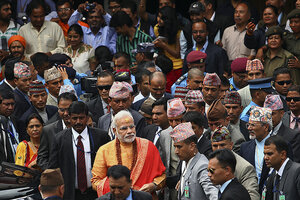Why India is upset about Nepal's new constitution
Ethnic minorities in Nepal are protesting the constitution put into effect on Sunday, but their Indian neighbors to the south are equally worried.

Indian Prime Minister Narendra Modi, in saffron, visits the Pashupatinath Temple on a state visit to Nepal last year. Nepalis have accused India of meddling after he expressed concern about continuing protests over the new Nepali constitution.
Kiran Panday/ AP
As President Ram Baran Yadav signed Nepal’s new constitution into effect on Sunday, promising his nation that it “has now opened the path for development,” the Indian government immediately issued a curt statement of concern.
“Throughout the process of Constitution making in Nepal, India has supported a federal, democratic, republican, and inclusive Constitution. We note the promulgation in Nepal today of a Constitution,” the statement begins, before urging a peaceful resolution to the violent protests that have sprung up around the Nepal, killing at least 40 in the last several weeks.
The constitution is the fruit of more than seven years of debate and conflict, topped off with April’s devastating earthquakes that killed nearly 8,900 Nepalis – a tragedy that some credit with making the country’s normally factious politicians more open to compromise. After abolishing the monarchy in 2008, Nepal has struggled to create a government acceptable to its more than 100 ethnic groups.
The constitution transforms Nepal, once an officially Hindu monarchy, into a secular, federal government composed of seven states, each with its own legislature. The presidency will be a mostly ceremonial position, with real power vested in the parliament. It sounds like what India wished for Nepal, so why are they getting involved?
Most immediately, India is worried about violence spilling across the Nepali border, which is surrounded by India on three sides, and typically quite open. In an interview with The Wall Street Journal last year, Nepal’s ambassador to India, Krishna Prasad Dhakal, stressed the neighboring countries’ extremely close ties: beyond the “tens of thousands” of Nepalis who live or work in India, and vice versa, 65 percent of the nation’s trade is with India, 46 percent of direct investment comes from India, and a quarter of the tourists in its booming travel industry are Indian.
Nepal’s southern border, where most of the constitutional uproar has been concentrated, presents a special difficulty. The Madhesi and Tharu ethnic groups who make their homes there claim that, while the new constitution appears to guarantee representation, its newly created states are actually designed to break minority groups into even less-powerful blocs.
Their discontent has led to rumors of secession, but more likely is migration from southern Nepal into northern India.
Beyond the Indian government’s immediate concerns, however, some Nepalis see an unwelcome pattern of meddling by India in their affairs.
As The Wall Street Journal observes, “India often plays a big brother role, one that is not often appreciated by many Nepalis.” After centuries of interwoven history, India finds it hard to shake an “interventionist mindset.” In fact, it helped Nepali parties broker their agreement with Maoist rebels that abolished the monarchy in the first place. In the latest round of constitutional talks, CNN-IBN reports that Indian Prime Minister Modi sought special assurance that the Madhesi’s concerns would be taken into account.
The Associated Press looked at the question, “Will Nepal's new constitution hold the country together?” Whether the constitution will strengthen or weaken its ties to India is also up in the air – but another close neighbor, China, is a fan.

